- Home
- Robert Graves
Claudius the God c-2 Page 11
Claudius the God c-2 Read online
Page 11
`Can you really love a man like that?' I asked.
She swore that there was no face so dear to her in the world. So I tried to get accustomed to the coin.
Besides Caligula's statues a good deal of his wasteful expenditure was represented by gold and silver objects in the Palace and elsewhere which could also be removed and converted into bullion. For instance, the golden door-knobs and window-panes and the gold and silver furniture in his temple. I removed it all. I gave the Palace a great clearing-out. In Caligula's bed-chamber I found the poison chest which had belonged to Livia and of which Caligula had made good use, sending presents of poisoned sweetmeats to men who had drawn their wills in his favour and sometimes pouring poison into the plates of dinner-guests, after first distracting their attention by some prearranged diversion. (He experienced most pleasure, he confessed, in watching them die from arsenic.) I took the whole chest down to Ostia with me the first calm day of spring and, rowing down the estuary in one of Caligula's pleasure-barges, dumped it overboard about a mile from the coast. A minute or two later thousands of dead fish came floating up. I had not told the sailors what the chest contained and some of them grabbed at the fish floating near, meaning to take them home to eat; but I stopped that, forbidding them to do so on pain of death.
Under Caligula's pillow I found his two famous books, on one of which was painted a bloody sword and on the other a bloody dagger. Caligula was always followed by a freedman carrying these two books, and if he heard something about a man which happened to displease him he used to say to the freedman, ` Protogenes, write that fellow's name down under the dagger' or `write his name down under the sword.' The sword was for those destined to execution, the dagger for those who were to be invited to commit suicide. The last names in the dagger-book were Vinicius, Asiaticus, Cassius Chaerea, and Tiberius Claudius - myself. These books I burned in a brazier with my own hands. And Protogenes I put to death. It was not only that I loathed the sight of this grim-faced, bloody-minded fellow who had always treated me with insufferable impudence, but that I was now given evidence that he had threatened senators and knights to write their names down in the book unless they paid him large sums of money. Caligula's memory was so bad at this time that Protogenes could easily have persuaded him that the entries were his own.
When I tried Protogenes he insisted that he had never uttered any such threats and never put any name down in the book except at Caligula's orders. This raised the question of the authority sufficient for a man's execution. It would be easy for one of my colonels to report to me dishonestly one morning: 'So-and-so was executed at dawn in accordance with your instructions of yesterday.' If I knew nothing of the matter it would merely be his word against mine that I had issued these instructions; and, as I am always ready to admit, my memory is none of the best. So I reintroduced the practice, started by Augustus and Livia, of immediately committing all decisions and directions to writing. Unless a paper could be, produced by my subordinates giving signed orders from me for any strong disciplinary action that they had taken or any important financial commitment or startling innovation in procedure that they had made, such action must not be regarded as authorized by me, and if I disapproved of it they must bear the blame themselves. In the end this practice, which was also adopted by my chief ministers in dealing with their own subordinates, became such a matter of course that one hardly ever heard a word spoken in government offices, during working hours, except for consultations between heads of departments or visits from City officials Every Palace servant carried a wax-tablet about with him in case it, should be needed for special orders to be, written upon.
All casual applicants for posts, grants, favours, indulgences, or what not were warned to present a document on entering the Palace, stating exactly what they wanted, and why and except in rare instances were not permitted to press their case by pleas and arguments delivered by word of mouth. This saved time but won my ministers an undeserved reputation for arrogance.
I shall tell you about my ministers. During the reigns of Tiberius and Caligula the real direction of affairs had fallen more and more, into the hands of Imperial freedmen, originally trained in secretarial duties by my grandmother Livia. The Consuls and City magistrates, though independent authorities answerable only to the Senate for carrying out their duties properly, had come to depend on the advice issued to them, in the Emperor's name, by these secretaries, especially in the case of complicated documents connected with legal and financial matters. They were shown where to affix their seals, or sign their names, the documents being already prepared for them, and seldom troubled to acquaint themselves with the contents. Their signature was in most cases a mere formality and they knew nothing at all about administrative detail compared with what the secretaries knew. Besides, the secretaries had developed a new sort of handwriting, full of abbreviations and hieroglyphs and hastily formed letters, that nobody but themselves, could read. I knew that it was impossible to expect any sudden change in this relation between the secretariat and the rest of the world, so for the present I strengthened rather than weakened the powers of the secretariat, confirming the appointments of those of Caligula's freedmen who were capable. For instance, I kept Callistus, who had been Secretary both to the Privy Purse and to the Public Treasury, which Caligula treated as a sort of Privy Purse. He had been aware of the plot against Caligula but had taken no active part in it. He told me a long story about having been recently instructed by Caligula to poison my food, but having nobly refused to do so. I did not believe it. In the first place, Caligula would never have given him those orders, but would have administered the poison with his own hands as usual; and in the second place, if he had, Callistus would never have dared to disobey. However, I let that go because he seemed anxious to continue with his Treasury duties and was the only man who really understood the ins and outs of the present financial, situation, I encouraged him by saying that I thought he had done remarkably well in keeping Caligula supplied with money so long and that I counted on him henceforth to use his gold-divining powers for the salvation of Rome' instead of for its destruction. His responsibilities extended to the direction of judicial inquiries into all public financial questions. I retained Myron as my legal secretary and Posides as my military Treasurer and put Harpocras in charge of all matters relating to Games and Entertainments and Amphaeus kept the Roll of Citizens. Myron also had the task of accompanying me whenever I went out in public, examining the messages and petitions handed to me, and sorting out the important, immediate ones from the customary shower of irrelevancies and importunities. My other chief ministers were Pallas whom I put in charge of my Privy Purse, his brother Felix whom I made my secretary for Foreign Affairs, Callon whom I made Superintendent of Stores, and his son Narcissus whom I made chief secretary for Home Affairs and private correspondence. Polybius was my religious secretary - for I was High Pontiff - and would also assist me in my historical work if ever I should get time for it. The last-named five were my own freedmen. During my days of bankruptcy I had been forced to dismiss them from my service and they had readily found clerical work to do at the Palace; so they were initiates in the Secretarial Mysteries and had even learned to write illegibly. I gave them all quarters in the New Palace, removing the rabble of sword-fighters, charioteers, grooms, actors, jugglers, and other hangers-on that Caligula had installed there. I made the Palace above all things a place for governmental work. I lived privately at the Old Palace, and in very modest style too, following the example of Augustus. For important banquets and visits of foreign princes I used Caligula's suite at the New Palace, where Messalina also had a wing for her own use.
When I gave my ministers their appointments I explained that I wanted them to act as much as possible on their own initiative; I could not be expected to direct them all in everything, even if I had been more experienced. I was not in the position of Augustus who, when he assumed control of affairs; was not only young and active but had a corps of capable advisers at his c
ommand, men of public distinction - Maecenas, Agrippa, Pollio, to name only three. I told them that they must do the best they could and that whenever they were faced by any difficulty they should consult The Roman Transactions of the God Augustus, the great memorial work published by Livia in the reign of Tiberius, and should keep closely to then forms and precedents that they found in it. If cases occurred where no precedent could be found in this invaluable record, they were, of course, to consult me; but I trusted them to save me as much unnecessary labour as possible. `Be bold,' I said, `but not too bold.'
I confessed to Messalina, who had helped me with these ministerial appointments, that the sharp edge of my Republican fervour was getting a little blunted: every day I felt more and more sympathy with, and respect for, Augustus. And respect for my grandmother Livia too, in spite of my personal dislike, for her. She had surely had a wonderfully methodical mind, and if, before restoring the Republic, I could get the governmental system working again even half as well as it had worked under her and Augustus I would be most .satisfied with myself. Messalina smilingly offered to play `the part of Livia for the occasion if I undertook that of Augustus. 'Absit omen,' I exclaimed, spitting in my bosom for luck. She answered that, joking aside, she had something of Livia's gift for summing up people's characters and deciding; just what appointments they were fit to hold. If I cared to give her a free hand she would act on my behalf in all social questions, relieving me of all the, cares connected with my office as Director of Public Morals. I was deeply in love with Messalina, you must know, and in the matter of choosing my ministers had found her judgement very shrewd, but I hesitated to allow her to take on as much responsibility as this. She begged me to let her give me some stronger proof of her capacity. She suggested that we should together go through the nominal roll of the Senatorial Order: she would tell me which names in her opinion were fit to remain on it. I called for the roll and we began to go through the list. I must confess that I was astonished at the detailed knowledge of the capacities and characters and private and public histories of the first twenty or so senators named in it. Wherever I could check her facts she was so accurate that I readily granted her request. I only consulted my own inclinations in a few doubtful cases, where she did not care very much whether the name was kept on the roll or struck off. After making inquiries through Callistus as to the financial qualifications of certain members, as well as deciding about their mental and moral qualifications,, we removed about one-third of the names and filled up the vacancies with the best knights available, and with former senators struck off the roll by Caligula for frivolous reasons. One of my own choices for removal was Sentius. I felt the need of getting rid of him, not merely because of his foolish speech to the Senate and his subsequent cowardice, but because he was one of the two senators who had accompanied me to the Palace at the time of Caligula's assassination and had then deserted me. The other, by the way, was Vitellius, but he now assured me that he had hurried off only to find Messalina and put her into a place of safety, expecting Sentius to stay and look after me; so I quite forgave him. I made Vitellius my understudy in case I should happen to fall ill or anything worse should happen to me. At all events, I got rid of Sentius. The reason that I gave for his degradation was that he had not appeared at the meeting of the Senate that I summoned to the Palace, having fled from Rome to his country estate without informing the Consuls that he would be absent; he had not returned for several days, and thus failed to benefit by the amnesty. Another leading senator that I degraded was Caligula's horse Incitatus who was to have become Consul three years later. I wrote to the Senate that I had no complaints to make against the private morals of this senator or his capacity for the tasks that had hitherto been assigned to him, but that he no longer had the necessary financial qualifications. For I had cut the pension awarded him by Caligula to the daily rations of a cavalry horse, dismissed his grooms and put him into an ordinary stable where the manger was of wood, not ivory, and the walls were whitewashed, not covered with frescoes. I did not, however, separate him from his wife, the mare Penelope: that would have been unjust.
Herod warned me to be constantly on my guard against assassination, saying that our revisions of the Roll of Senators and the further revisions that we had made in the Roll of Knights had won me many enemies. An amnesty was all very well, he said, but the generosity must not be too one-sided. Vinicius and Asiaticus, according to him, were already saying cynically that new brooms sweep clean, that Caligula and Tiberius had also,, started their reigns with a pretence of benevolence and rectitude, and that I would probably end by becoming as mad a despot as either of them. Herod advised me not to enter the Senate House for some time and even then to take every safeguard against assassination. This alarmed me. It was difficult to decide what safeguards were sufficient, and so I did not enter the Senate House for a whole month. By that time I had decided on the appropriate safeguard: I asked for and was granted permission to enter the House with an armed escort consisting of four Guards Colonels and Rufrius, the Guards Commander. I even put Rufrius on the Roll of Senators, though he did not have the proper financial qualifications, and the Senate at my request gave him permission to speak and vote whenever he entered in my company. On Messalina's advice, too, everyone who came into my presence at the Palace or elsewhere was first searched for concealed weapons: even women and boys. I did not like the notion of women being searched, but Messalina insisted, and I consented, on condition that the searching was done by her freedwomen and not by my soldiers. Messalina also insisted on my having armed soldiers in attendance during banquets. In Augustus's day this would have been considered a most despotic practice and I was ashamed to see them lined up along the walls; but I could take no risks.
I worked hard to restore the Senate's self-respect. In choosing new members Messalina and I were as careful in our inquiries about their family histories as we were about their personal capacities. As if at the request of the senior members of the Senatorial Order, though it was really my own idea, I promised not to choose anyone who could not reckon four descents in the male line from a Roman citizen. I kept this promise. The only apparent exception I' made was in the case of Felix, my foreign secretary, whom some years later I had occasion to invest with senatorial dignity. He was a younger brother of my freedman Pallas, and, born after their father had been given his freedom: so he was never a slave, as Pallas had been. But even here I did not break my promise to the Senate: I asked a member of the Claudian house - not a true Claudian, but a member of a family of Claudian retainers, originally immigrants to the City from Campania, who had been given the, citizenship and allowed to take the Claudian name - to adopt Felix as his son. So now Felix, in theory at least, has the necessary four lines of descent. But there were jealous murmurs from the House when I introducedhim to
them. Someone said: `Caesar, these things were not done in the days of our ancestors.'
I replied angrily: 'I do not think, my Lord, that you have any right to talk in this way, Your own family is not as noble as all that: I've heard that they were selling faggots in the streets in my great-great-grandfather's time, and I've heard that they gave short weight, too.'
`It's a lie,' shouted the Senator. `They were honest innkeepers.'
The House laughed the man down. But I felt obliged to say a little more. `When he was appointed Censor more than three hundred years ago, my ancestor Claudius the Blind, victor of the Etruscans and Samnites and the first Roman author of distinction, admitted the sons of freedmen to the Senate just as I have done. Numerous members of this House owe their presence here to-day- to this innovation of my ancestor. Would they care to resign?' The House then welcomed Felix warmly.
There were many rich idlers among the knights as there had been, indeed, even in Augustus's day. But I did not follow Augustus's example 'in permitting them to remain idle. I gave out that any man who shirked public office when asked to undertake it would be expelled from the Order. In three or four cases I was as good as
my word.
Among the papers that I found at the Palace in Caligula's private safe were those referring to the trials and deaths, under Tiberius of my nephews Drusus and Nero, and their mother Agrippina. Caligula had-pretended to burn the whole lot at the beginning of his reign, as a magnanimous gesture, but had not really done so, and the witnesses against my nephews and sister-in-law and the senators who had voted for their deaths had been in constant terror -of his vengeance. I went carefully through the papers and called up before me as many as survived of the men mentioned' in them as having been implicated in these judicial murders. The document which concerned each man was read over to him in my presence and then given into his own hands to burn in the fire before him. I may here mention the cipher dossiers of the private lives of prominent citizens which Tiberius had taken from Livia after Augustus's death but had been unable to read. Later I managed to decipher them, but they referred to events by this time so out of date that my interest in reading them was more a historical than a political one.
The two most important tasks that now presented themselves were the gradual reorganization of State finances and the abolition of the most offensive of Caligula's decrees. Neither could, however, be undertaken in a hurry. I had a long conference with Callistus and Pallas about finances immediately after their appointment. Herod was present too; because he probably knew more than any other man living about the raising of loans and the management of debts. The first question that presented itself was how to get hold of ready money for immediate expenses. We agreed to settle this, as I have already explained, by the melting down of gold statues and gold plate and ornaments in the Palace and the gold furniture in Caligula's temple. Herod suggested that I should add to the money thus realized by borrowing in the name of Capitoline Jove from other Gods whose temple treasuries had become cluttered in the course of the last hundred years or so by useless and showy votive offerings in precious metal. These were mostly the gift of people who wished to call attention to themselves as successful public men, not made in any real, spirit of piety. For instance, a merchant, after a successful trading venture to the East, would present the God Mercury with a golden horn of plenty, or, a successful soldier would present Mars with a golden shield, or a successful lawyer would present Apollo with a golden tripod. Clearly, Apollo could have no use for 200, or 300 gold and silver tripods; and if his father Jove was in need he surely would be only too pleased to lend him a few. So I melted down and minted into coin as many of these votive offerings as I could remove without offending the families of the donors or destroying works of historic or artistic value. For a loan to Jove was the same as a loan to the Treasury. We agreed at this, conference that loans must also be raised from the bankers. We would promise them an attractive rate of interest. But Herod said that the most important thing was to restore public confidence and so force back into circulation the money that had been hoarded, by nervous businessmen. He declared that although a policy of great economy was necessary, economy could be carried too far. It must not be interpreted as meanness. `Whenever I ran short of money,' he said, `in my needy days, I always made a point of spending all the money I had left on personal adornment - rings and cloaks and beautiful new shoes. This sent my credit up and enabled me to borrow again. I would advise you to do much the same. A little bit of gold leaf, for example, goes a long way. Suppose you were to send along a couple of goldsmiths to gild the goals in the Circus, it would make everyone feel very prosperous and wouldn't cost you more than, fifty or, a hundred gold pieces. And another idea occurred to me this morning as I was watching, those great slabs of marble from Sicily being. carried up the hill for facing the inside of Caligula's temple. You're not going to do any more work on the temple, are you? Well, then, why not use them to face the sandstone barrier of the Circus? It's beautiful marble and ought to cause a tremendous sensation.'

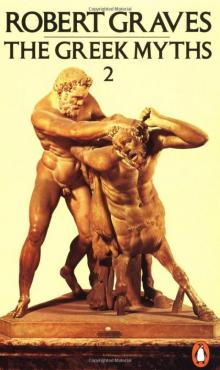 The Greek Myths, Volume2
The Greek Myths, Volume2 The Anger of Achilles: Homer's Iliad
The Anger of Achilles: Homer's Iliad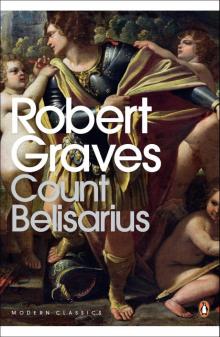 Count Belisarius
Count Belisarius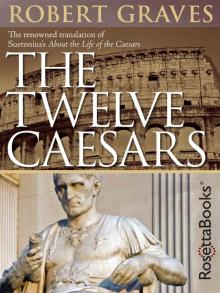 The Twelve Caesars
The Twelve Caesars Complete Poems 3 (Robert Graves Programme)
Complete Poems 3 (Robert Graves Programme) Homer's Daughter
Homer's Daughter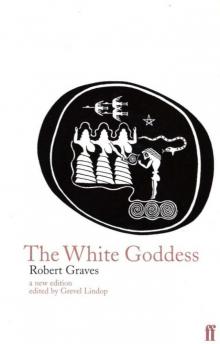 The White Goddess
The White Goddess Goodbye to All That
Goodbye to All That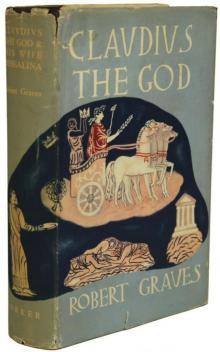 Claudius the God and His Wife Messalina
Claudius the God and His Wife Messalina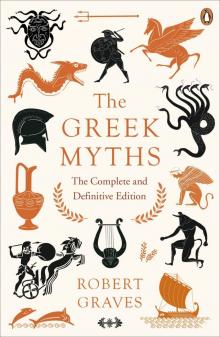 The Greek Myths
The Greek Myths I, Claudius
I, Claudius The Islands of Unwisdom
The Islands of Unwisdom Complete Short Stories
Complete Short Stories The Golden Fleece
The Golden Fleece They Hanged My Saintly Billy
They Hanged My Saintly Billy King Jesus
King Jesus Sergeant Lamb's America
Sergeant Lamb's America Hebrew Myths: The Book of Genesis
Hebrew Myths: The Book of Genesis Seven Days in New Crete
Seven Days in New Crete Proceed, Sergeant Lamb
Proceed, Sergeant Lamb Claudius the God
Claudius the God Wife to Mr. Milton
Wife to Mr. Milton The Complete Poems
The Complete Poems The Anger of Achilles
The Anger of Achilles Claudius the God c-2
Claudius the God c-2 Hebrew Myths
Hebrew Myths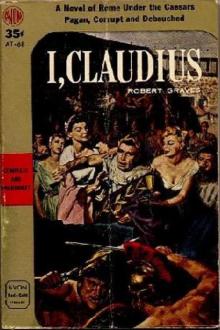 I, Claudius c-1
I, Claudius c-1 The Greek Myths, Volume 1
The Greek Myths, Volume 1